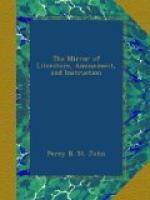Ancient Pitch-in-the Hole.—A soldier was brought to Alexander to exhibit a trick which he had acquired, of pitching a pea into a distant hole, which just fitted it;—when the reward which the great conqueror bestowed upon the soldier for his useless application of time was a peck of peas. P.T.W.
Pekin.—Balducci Pegalotti, a Florentine writer upon commerce, about the year 1340, describes Pekin (under the name of Cambalu) the capital city of China, as being one hundred miles in circumference. He also states the journey from the Genoese territories to Pekin as of rather more than eight months, going and returning; and he assures us it was perfectly secure, not only for caravans, but for a single traveller, with a couple of interpreters and a servant.
Mercers and Drapers.—Among the trading companies into which the middling ranks were distributed on the continent, in the twelfth century, those concerned in silk and woollens were most numerous and honourable. None were admitted to the rank of burgesses in the towns of Aragon who used any manual trade, with the exception of dealers in fine cloths.
Usury.—The interest of money was exceedingly high throughout the middle ages. At Verona, in 1228, it was fixed by law at 12-1/2 per cent.; at Modena, in 1270, it seems to have been as high as 20. The republic of Genoa, towards the end of the fourteenth century, when Italy had grown wealthy, paid only from 7 to 10 per cent. to her creditors. But in France and England the rate was far more oppressive. An ordinance of Philip the Fair, in 1311, allows 20 per cent. after the first year of the loan. Under Henry III., according to Matthew Paris, the debtor paid 10 per cent. every two months; but this is absolutely incredible as a general practice.
Worsted.—Blomefield, the historian of Norfolk, thinks that a colony of Flemings settled, as early as the reign of Henry II., at Worsted—a village in that county—and immortalized its name by their manufacture. It soon reached Norwich, though not conspicuous till the reign of Edward I.
The Lord’s Prayer in Arawaak.[21]—Kururumanny—haamary caleery oboraady—bachooty deweet bossa—baynse parocan, bayin so pareeka—yahaboo ororoo adiako—meherachehbeyn dacotooniah—Ebehey nebehedow wakayany odomay—Mayera toonebah dayensey—Boboro talidey.—Hedouainey.—Jour. Geog. Soc.
[21] An Indian nation, settled in British Guiana.




